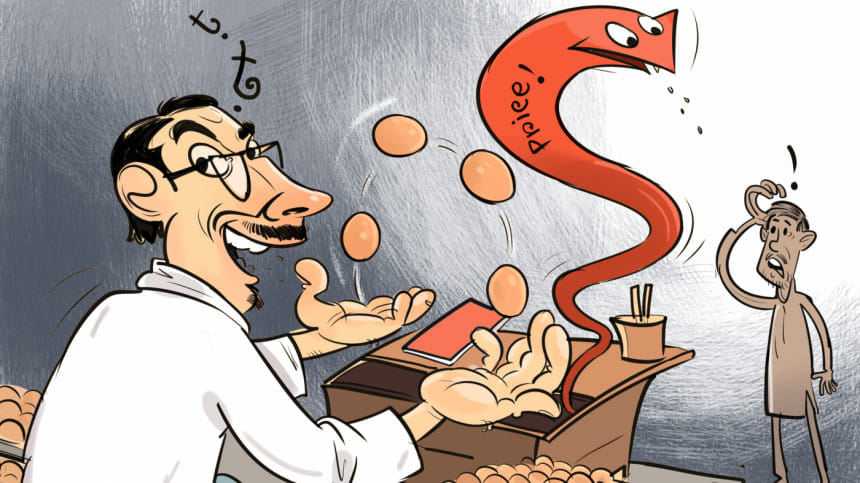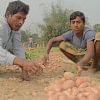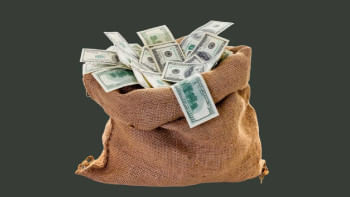What the egg is happening?

If you suspect a certain smugness in the smiles of vegans and the miniscule, generally egg-hating community, you are not imagining things. They are bemused with all the fuss we, the egg-loving people of this country, are making over the preposterous prices of this otherwise cheap source of protein. Eggs can cost Tk 170 to Tk 180 a dozen these days, which is the same as one kilogram of broiler chicken. If that isn't soul-crushing, think about this: even cracked eggs which people were buying at slightly lower prices have become costlier. One can only guess that our favourite traditional plain cake from the corner bakery will also become pricier when sellers decide to hike up the price of "slightly off" eggs, apparently an essential ingredient for this confectionary.
So, if you are in the category of the majority of humans on this earth – that is, the egg-loving kind – you will understand why the egg situation is getting so serious. Just think of the number of times you have been ravenous and found nothing in the house except eggs, and felt that intense, euphoric relief. Fry them, scramble them, boil them, make them into an exotic omelette or curry – eggs in any form are just amazing. I mean just utter the word "omelette" and realise how delectable it sounds. And what is more soothing than having a classic onion and chilli omelette with some hot rice and daal (lentils), with a spot of ghee if you're lucky? The perfect go-to comfort food.
Eggs are also nicknamed as a "complete food," being loaded with high quality protein, vitamins, minerals and good fats, not to mention small amounts of calcium, iron, potassium and so on. Eggs are good for the skin, hair, bones, eyes – for the soul. Need we say more?
Here's an eggy maths problem for the next board exam: if the price of an egg on August 5 was Tk 12 and the daily demand is 40 million eggs, what would be the price of eggs for the whole country if it was Tk 15 on August 15? Well, Tk 60 crore.
So, it wouldn't be inappropriate, in the wake of these absurd price surges of this wonderful, simple wholesome food, if consumers demand to know: what the egg is happening?
Well, according to news reports, we have the usual group of greedy traders who are more interested in fattening their wallets than charging the actual market price of eggs. The director-general of the Directorate of National Consumers' Right Protection (DNCRP) – yes, folks, we do have one – has stated that traders have given the excuse of low production, bad weather and disruptions in supply to hike up prices to abnormal levels, excuses he obviously didn't buy. Here's an eggy maths problem for the next board exam: if the price of an egg on August 5 was Tk 12 and the daily demand is 40 million eggs, what would be the price of eggs for the whole country if it was Tk 15 on August 15? Well, Tk 60 crore (if all things remained the same), which would be a Tk 12 crore increase in 10 days. Sadly, all things seldom remain the same, especially the prices of essentials which traditionally just go up and up, making it difficult to design a maths problem with so many variables.
Realising that the egg situation was getting far too messy for comfort, the DNCRP conducted raids and magically, the price fell to about Tk 13.5 an egg, which is still quite steep. The fisheries and livestock minister has declared that it costs Tk 10.50 to produce an egg, so the price of an egg should be fixed at Tk 12, and this would benefit the entire supply chain. The problem is that random raids will only sober up the crazy kitchen market for a brief period of time, and without the authorities keeping constant tabs on the prices, eggs and everything else we need will be at the whims of these knavish traders.
Meanwhile, the commerce minister has uttered the unthinkable: import eggs if necessary. Importing eggs? Are you serious?
As hard as it is to digest, the fact is that we do import quite a lot of essential food items to meet our national demand. This includes rice, which we are supposed to be totally self-sufficient in, along with wheat, maize, edible oil, powdered milk, lentils and even onions. The last item is a curious one and is considered a necessity for all Bangladeshi households. Most Bangladeshi palates prefer the native kind, not because of patriotism but because they taste better and have that extra "kick"; while imported onions are bigger, they are also blander.
The question, however, still lingers like a chronic sinus infection: why are we not increasing food production at home and being less dependent on imports, especially considering the dwindling dollar reserves? This is the burning question that our policymakers must figure out how to answer satisfactorily. According to official declarations, we are increasing production, but it doesn't explain why billions of dollars are spent on food imports. Not only that, we import all kinds of things needed to grow crops – chemical fertilisers and pesticides, for instance – so if prices of those go up, so will those of the end products. We also haven't been able to address the increasing salinity (and death) of agricultural land, thanks to rampant shrimp cultivation. Is it such a hard choice to decide whether it is more pressing to grow more rice and vegetables to feed ourselves than to facilitate export of an item that results in more and more barren land where nothing will grow?
We also seem to be unable to shrug off our fascination with all things foreign. Which is why, instead of exploring our own gas reserves (which would help to expand agriculture) and investing in clean, renewable energy, we prefer to import LNG and be dependent on dirty energy that drains away our foreign exchange reserves.
And now we are thinking of eggs coming to Bangladesh all the way from Timbuktu. Will these be real eggs or the fake kind that we see in disturbing videos on social media? We hope things don't reach such extreme points, and those abominable traders will take out the eggs they have been hiding, so that we can go back to the days when the thought of buying a few eggs for the family would not bring about a panic attack.
Aasha Mehreen Amin is joint editor at The Daily Star.

 For all latest news, follow The Daily Star's Google News channel.
For all latest news, follow The Daily Star's Google News channel. 










Comments